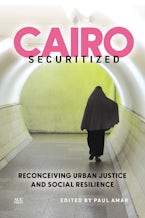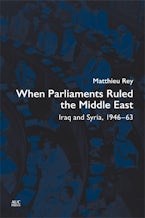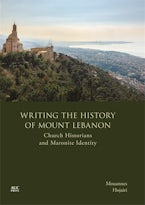- Home
- Middle East Urban Studies
- Cairo Securitized

Cairo Securitized
Reconceiving Urban Justice and Social Resilience
Edited by Paul Amar
Series edited by Deen Sharp and Noura Wahby
Series: Middle East Urban Studies
500 Pages, 6.00 x 9.00 in, 10 Maps and Figures 6 Tables
- Hardback
- 9781649031716
- January 2024
- Region: US & Canada, UK, Europe & Rest of World
$79.95
£69.99
- Digital download and online
- 9781649033154
- January 2024
- Region: Worldwide
$78.99
- Digital download and online
- 9781649033161
- January 2024
- Region: Worldwide
$78.99
Where To Buy:
A rich examination of the securitization of the everyday lives of the citizens of Cairo and how to build a more equitable urban order
Until the year 2000, Cairo had been a model megacity, relatively crime free, safe, and public facing. It featured a thriving public culture and vibrant street life. In recent decades, however, the Egyptian state has accelerated a wholesale dismantlement of public education and public sector jobs and reversed the modest land reforms of the Nasser era. As a result, the vast majority of Cairo’s people have been forcibly deprived of their social rights, social goods, and educational capital.
Eschewing the traditional focus on top-down regime and state security, the contributors to this volume, who represent a wide array of academics, activists, artists, and journalists, explore how repressive policies affect the everyday lives of citizens. They show the ways in which urban security crises are politically fashioned and do not emanate from the urban social fabric on their own: city crime, violence, and fear are created by specific means of extraction, production, and control.
Another kind of city can live again. But how? By tackling a range of issues, including public health, transportation, labor safety, and housing and property distribution, Cairo Securitized unsettles simplistic binaries of thug and police, public versus private, and slum versus enclave, and proposes compelling new ways in which securitizing processes can be reversed, reengineered, and replaced with a participatory and equitable urban order.
Contributors:
Sara Soumaya Abed African Leadership Centre, Kings College London
Zeinab Abul-Magd Oberlin College, USA
Mohamed Ahmed Political Scientist and historian, Cairo Egypt
Rania Ahmed Independent Researcher, Cairo Egypt
Nicholas Simcik Arese University of Cambridge, UK
Ahmed Awadalla University of Strathclyde, Glasgow, UK
Ahmad Borham The American University in Cairo, Cairo Egypt
Miguel A. Fuentes Carreño University of California, Santa Barbara, USA
Roberta Duffield Scholar on urbanism, public space, Cairo Egypt
Momen El-Husseiny The American University in Cairo, Cairo Egypt
Mohamed Elmeshad SOAS, London UK
Ifdal Elsaket Netherlands-Flemish Institute, Cairo Egypt
Mohamed Elshahed Independent Writer and Curator, Mexico City
Amy Fallas University of California Santa Barbara, USA
Tina Guirguis University of California, Santa Barbara, USA
Elena Habersky The American University in Cairo, Cairo Egypt
Hanan Hammad Texas Christian University, USA
Hatem Hassan Impact Justice, Pittsburgh, USA
Amira Hetaba Federal Government of Lower Austria, Austria
Deena Khalil The American University in Cairo, Cairo Egypt
Omnia Khalil City University of New York, USA
Sabrina Lilleby University of Texas, Austin, USA
Paul Miranda Nonviolent Peaceforce, South Mosul, Iraq
Mostafa Mohie American University in Cairo, Cairo Egypt
Laura Monfleur University François-Rabelais, Tours, France
Aya Nassar Royal Holloway, University of London, UK
Nora Noralla human rights researcher, Berlin, Germany
Aly El Reggal Scuola Normale Superiore, Florence Italy
Afsaneh Rigot Harvard University, Cambridge USA
Yahia Saleh Malmö University, Sweden
Bassem al-Samragy political analyst at the International Criminal Court, The Hague, The Netherlands
Yahia Shawkat Technische Universität Berlin, Germany
Maïa Sinno Géographie Cités Lab, CNRS / Sorbonne University, Paris France
Mark Westmoreland Leiden University, The Netherlands
Contents
Contributors
Introduction: “Cairo Securitized: Can Another World be Made?”
Paul Amar
Section I: Vernacular Mediascaping
Beyond the binary of digital/virtual space versus street/real space
1. The Crime of Shamelessness: TikTok Women, the Principle of Bodily Integrity, and Independence without Regrets
Sara Soumaya Abed
2. Securitized Consolidation, or How the State Co-opted Private Media
Mohamed Elmeshad
3. The City and the Jungle: Africa and Blackness in the Egyptian Interwar Cinematic Imagination
Ifdal Elsaket
4. Viral Visualities, Image Cycles, and Mosireen’s Revolutionary Archives
Mark Westmoreland
5. Queer Digital Activism: Street Media and Subversion of Digital Securitization
Afsaneh Rigot and Nora Noralla
Section II: Reversing Social Cleansing and Depathologizing Justice
Beyond the binaries of sociability versus social cleansing, value versus waste, abled versus
debilitated, medicine versus magic
6. Toilets for the People? Hygiene in the City and Depathologizing Popular Sanitation
Tina Guirguis
7. Cairo’s Sexuality Infrastructures: Securitizing Abortion, HIV, and Gender Affirming
Surgery
Miguel A. Fuentes Carreño
8. Road to the Future: Infrastructure and Landscape Sanitized of Trees and People, Viewed
from ‘God’s Eyes’
Mohamed elShahed
9. The Khaki Color of Football: Digitized Militarization of Egypt’s Most Popular Game
Rania Ahmed
Section III: Anti-enclave Densityphilia
Beyond the binary of working-class slum versus elite gated city
10. Urban (Counter) Revolution Against Gentrification: Shadow Security Networks, Baltagiyya Subjectivities, and Urban Densities
Omnia Khalil
11. Urbanizing Dreams: The Struggles of Attaining ‘New’ Social Contracts for Middle- and
Upper-Middle Classes at Cairo’s Desert Edge
Momen ElHusseiny
12. Military Capitalism: Economic and Security Logics of Egypt’s New Administrative Capital
Roberta Duffield
13. Gulf Investments, Megacontractor Projects, and Urban Isomorphism: The Imposition of a
New Way of Life
Maïa Sinno
Section IV: Convivial Sociabilities
Beyond the binaries of street mobility versus family domesticity, public versus private
14. Cairo Up! Infrastructures of Security and Desire
Aya Nassar
15. The Curious Cases of the Disappearing Maids: Mobilization and Precarity Among Foreign
Domestic Workers in Cairo
Sabrina Lilleby
16. Cruising Ethics in Cairo: Queer Street Socialities against Fear Regimes
Ahmed Awadalla
17. South Sudanese Refugees and Community Schools in Cairo: A Home Away from Home
Amira Hetaba and Elena Habersky
18. Entangled in the City: Interstitial and Queer Urbanism through the Eyes of a Second-
Generation Nubian
Yahia Saleh
Section V: Participatory Futurity
Beyond the binary of informal versus planned
19. Seeing Like a City-State: Behavioral Planning and Governance in Egypt’s First Affordable
Gated Community
Nicholas Simcik Arese
20. Peripheralization and Infrastructural Violence: “Haussmanization” in Managua, Nicaragua and Cairo, Egypt
Ahmad Borham
21. Statizing Informality and Unbundling Rights: Neoliberal Infrastructure in Cairo’s ‘Ashwa’iyyat
Deena Khalil
22. Al-Asmarat: Managing Informality, Reproducing Precarity, and Dislocating Workers
Mostafa Mohie
23. Pacta Sunt Servanda? Exercising Possession in an Informalized Cairo
Yahia Shawkat
Section VI: Enforcement Sovereignties
Beyond the binary of thugs versus police
24. Gestures of Territorialism: Baltagiyya, Land Anxieties, and Securitizing Squatting
Hatem Hassan
25. Cairo Militarized: Army Economies, Security Industries, and Surveillance Geographies
Zeinab Abul-Magd
26. Thuggery, Urbanity, and Enforced Sovereignties: Competing Universes of the Baltaga
Aly el Raggal
27. Deconstructing Thuggery: Riots, Prison Breaks, and the Criminal Subject of (Non)Violent
Street Politics
Mohamed Ahmed
28. Sectarian Politics? Securitization, Urban Development, and Coptic Advocacy in Cairo
Amy Fallas
Section VII: Abolitionist Desecuritization
Beyond the binary of “crime from below” versus “security from above”
29. Security from Within: The Case of Informal Policing of Al-Mataria Neighborhood
Bassem al-Samragy
30. Challenging Urban Militarization in Post-2011 Downtown Cairo: Walls and Checkpoints
Laura Monfleur
31. Becoming a Man in Cairo: Sudanese and South Sudanese Refugees, Gangs, and Structural
Violence
Paul Miranda
32. Policing Women’s Sexual Economies in Downtown Cairo: Students and their Brothel
Friends in Colonial Times
Hanan Hammad
Index
Paul Amar is professor in the Global Studies Department and director of the Orfalea Center for Global & International Studies at the University of California, Santa Barbara. Before his academic career, he worked as a journalist in Cairo, a police reformer and sexuality-rights activist in Rio de Janeiro, and as a conflict resolution and economic development specialist at the United Nations. He is co-editor of Cairo Cosmopolitan: Politics, Culture, and Urban Space in the New Globalized Middle East (AUC Press, 2006) and author of the award-winning The Security Archipelago: Human-Security States, Sexuality Politics, and the End of Neoliberalism (2013), among several publications.
"A landmark in critical security studies and global studies from the global South. Bringing together some of the most astute emerging scholars, artists, and practitioners, Paul Amar's volume bypasses stale analytical binaries. Brimming with extraordinary insights and multiscalar analysis, Cairo Securitized is a model for future scholars seeking to produce cutting edge and methodologically and epistemologically innovative work.”—Omar S. Dahi, Hampshire College
"A must read. Cairo Securitized’s streamlined, diamond-cut contributions will captivate the general public, students, journalists, travelers, and policymakers. This bold and articulate group of scholar-activists sets out to remake Security Studies, Urban Studies, Gender/Sexuality Studies, and Global Studies from the street-level up. They unleash new concepts for comprehending Cairo, specifically, and, more generally, for shaping a more just and empowering urban social order in any of today’s increasingly unequal and insecure megacities."—Bassam Haddad, George Mason University
"Cairo Securitized offers a remarkable and compelling new approach to understanding how security regimes permeate the geography of Cairo (its physical, temporal, and digital geographies) and the bodies that inhabit it. The collection of contributors and topics is exquisitely curated, and amplifies the voices of both scholars and activists from the region, reflecting a remarkable array of expertise. This volume will be essential reading not only for security studies scholars, but for anyone, in any discipline, studying the contemporary Middle East."—L. L. Wynn, Macquarie University











